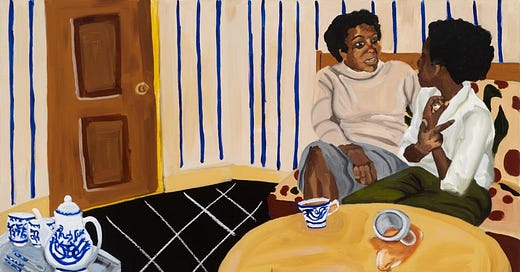“Anyone who writes is a seeker. You look at a blank page and you’re seeking. That role is assigned to us and never removed”
— Louise Glück
Inevitably, every writer faces some sort of imposter syndrome. For us writers who are traversing non-traditional paths to exercise their craft, it can feel overwhelming and daunting trying to trust we are capable. Learning how to move beyond our doubts and fears in order to harness what was once considered a weakness as a key part of what makes our words their own is key in finding our voices.
Writing alongside Alex Lewis is a gift. Anyone who has done so knows he reads and responds with a thoughtful, tender heart. He has held a mirror up to me countless times imploring me to see what is not always clear to my eye. To be known by Alex is to be seen by Alex. Having him in my writing community has helped me both grow confidence in my pen and ground in the knowing that my work is necessary.
For part two of our conversation, we explore what it means to be a writer, imposter syndrome, and why we must trust that we are the only people who can write the piece.
These are edited excerpts from the conversation.
Alex: You had mentioned earlier in the conversation about how you wanted to write this poetry book. I'm curious–why a book? Why did that feel like the natural next step?
Shivani: Part of it came from imposter syndrome. I'm not a writer by training. I work as an engineer where I do a lot of cut-and-dry technical writing. My creative writing is self taught. When I moved to Chicago in 2022, that’s when I gave myself permission to trust this was an important part of my life. I wanted it to be prominent for me.
In Chicago, there's a huge poetry community, a huge writing community. While it was brilliant, I also felt like everyone had published in journals or anthologies or even had their own books. So it felt like I wasn’t a writer unless I published a book—which is part of why I felt like I needed to write a book.
Another part was, I wanted there to be a culmination of my work somewhere. But as I was putting this book of poems together, I realized I wasn’t really interested in doing that anymore. I still write poems. I love poetry. I am a poet first and foremost. But I gave myself the allowance to let go of things that no longer feel aligned with where I am, my goals, and what I want to do. Releasing the idea that a book makes you a writer has been huge. It’s allowed me to explore different types of writing like freelance music and culture journalism where I have interviewed musicians and writers I loved just because I want to. My writing journey has flowered where it needed to.
And now, I’m writing my first fiction novel, which is really exciting. I think it’d be easy to feel like all the poems and essays that haven’t made their way to a book are just abandoned or that I’m starting all over again. But there’s this quote by Toni Morrison: “ Struggling through the work is extremely important – more important to me than publishing it.” So while yes, those poems were years of my life, I know that, without them, I wouldn’t be able to write this novel. It’s the idea of no love is wasted time or energy. It’s always valuable. It’s always important. You’re always learning something from it.
Alex: I think you found excitement within this work. You found something that wasn't necessarily there when you started. But over time, you found these different themes that continue to show up for you. Like you said, this story that you were continuing to return to and navigating your way through.
Shivani: And I know that you had written a book last year for your grandmother that was a collection of essays. How does it feel meeting a goal like that, especially after sharing it with someone you loved so much and who inspired a lot of the work in it?
Alex: It feels enough and not enough. The “enough” piece was writing that book for my grandma who told me, ‘Hey, I want to hold your work, hold your words in my hands, before I die.’ [She is] someone who means the most to me, who was always willing to do whatever she could to help me feel comfortable and to make sure I had what I needed, even still as she just celebrated 90 [years old]. She was just telling me the other day that she’s seeing the stuff I've been writing and keeping up with it. That’s really cool for me. So, it felt like that’s the easiest thing I can do – to fulfill this wish, fulfill this promise. The writing is already there. The words are already there. I already have the words that I can include as part of this book, this collection. That’s easy.
For me, [the hard part] was ensuring that I stayed on top of it and made time for it. What I knew I’d be most proud of handing over [to her] required me to sit with my older essays and edit them. Nothing crazy. Just smoothen out some of that older writing. I’m sure, months from now, I’ll look back at stuff I’m writing now and probably want to write that differently. For where I was at that moment, I wanted to sit with some of that older work and pull it up to the quality of the writing that I had started to do. Being able to receive that message from her that she received it – that was really cool to do the thing I said I was going to do.
The “not enough” piece connects back to what you were saying about moving to Chicago and folks already being published and feeling like the only way this matters is if [I publish] a book that’s shared broadly. For me, I know deep down that’s not the truth.
Of course, people ask, ‘Yo, you wrote this book. Where can I get it?’ To me, that is more a product of how we’re conditioned to think about what type of writing matters. It’s less about us as writers because obviously this work that we're doing and we're committing ourselves to is meaningful. It’s more a matter of how we tell people meaningful writing has to show up in book-form since that’s a lot of people’s primary interaction with good writing. But good writing exists whether it's in a book or not. Even for writers we know that aren’t doing the freelance thing or are doing the circuit of trying to get published, that writing is still important. I just hope people can still see themselves as worthy of being called a writer and worthy of considering their work as meaningful even if they have no aspirations of writing a book or pursuing some form of traditional publishing.
Shivani: It’s important to remember traditional publishing is a business, and it is not always the best writing that sells. It is what is the most marketable, what is going to make money, what is going to get into bookstores. There are so many moving parts. I think part of the want to be published comes from a sense of external validation. The idea that if my work is published then someone likes it. And if someone likes it, then I'm being seen—which is huge, especially when you're writing about something personal, which is also why that rejection can be so personal.
I used to submit [to writing journals and magazines] so much a couple years ago. It would just be rejection after rejection after rejection. And the editors of these publications didn't have the resources – the time, the energy, the money – to tell me what it is that's not working. So then, it felt like it was just me that wasn’t working.
But more and more, I’m learning that I write because I need to, I want to, and I love to. And I also have the ability to connect with people through this writing. How special is that? Whether they read everything that I write or just some of it – it’s wild. I don’t take that for granted. I ground myself in the fact that this, in and of itself, is a miracle. And that is enough for me.
Alex: There’s clearly something here that we’ve been able to find that makes sense for us. You could look at athletes like Kevin Durant. The game comes so easily to him. There’s an innate connection to the game. Yes, he works hard. And yes, he is one of the greats for a reason, but there are certain things about his game, how he shows up, how he’s gifted that are simply just there like some kind of act of God.
For us, as writers, people who choose to come to the page and see where it takes us, there is something really beautiful and brave about doing that. But there’s also this sense of confidence and this thing that is intangible in knowing we can do it. I know that I can keep coming to the page. I am confident that I am going to have something to share because I know deep down within myself I can do this. I know that I will be able to find the words that are necessary for me, that I’m going to be proud of, and that have the ability to impact somebody else. There’s something special about knowing who you are and knowing that I am capable of doing that work that would make a book, stand on somebody’s website, be in somebody’s newspaper or magazine.
Shivani: To me, being a writer is so easily romanticized – you make a cup of tea, you have beautiful light shining on your desk. And yes, have your rituals, have your traditions. But understand that, at the end of this, it’s work. Are you going to hold yourself responsible? Have discipline with your work? Have consistency? And will you understand that will change as you change, as the seasons change, as life’s demands change? But most important, do you have the audacity to trust yourself? Because you can do it, you are capable of doing it. I think that space is where something otherworldly is possible. And then that’s where it feels very tangible that, yes, I am the only person who can write this piece.







I love being able to witness this friendship in this room you are inviting readers into, the people need more 📖
Defining that writers don’t come into existence once and ONLY once a book is published is life to me. Thank you .